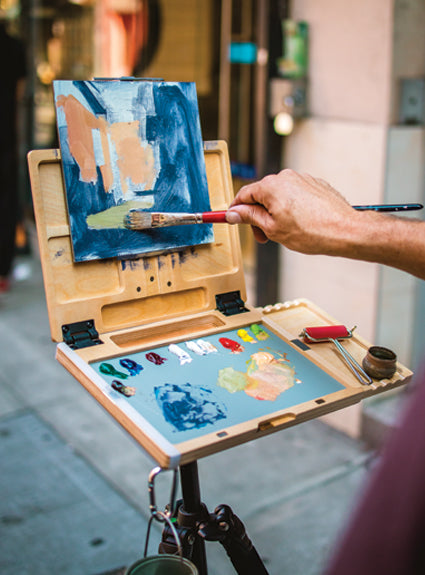INTERVIEW with SCOTT GELLATLY
WHERE DO YOU LIVE AND WORK?
I currently live and work in Portland, OR
TELL US ABOUT YOUR PAINTING CAREER.
I'm an Artist and Art Educator.
WHAT IS YOUR EDUCATIONAL BACKGROUND IN THE ARTS?
Bachelor of Fine Arts, with emphasis on painting and drawing, from the University of Oregon.
WHAT IS A LITTLE KNOWN FACT YOU WOULD LIKE TO SHARE?
The past three winters, I have coached my son's basketball teams. Though my coaching days may be behind me, I am retiring with a cumulative winning record.
WE HEAR YOUR CREATIVE ENDEAVORS BEGAN WITH THE BASS GUITAR WHEN YOU WERE YOUNGER. HOW DID MUSIC EFFECT YOUR APPROACH TO PAINTING?
Yes, in middle school my main interests were music, art, and sports. I was playing in a band by age fifteen. By age sixteen, I was playing in clubs around Portland, so at this point, music was taking up most of my free time. It was a blast. I was fortunate to have the opportunity to play in bands throughout college and beyond.
Like music, painting is about honing both the craft and the expressive voice. Like improvising with other musicians, I approach my painting as creating an immediate response to what is around me, free from pre-conceived notions.

TELL US ABOUT YOUR PROCESS FROM THE FIELD TO THE STUDIO.
For many years, I would paint plein air in oils, spending two to three hours on a painting. Over the last year, however, I have transitioned most of my work in the field to smaller studies in sketchbooks using water-based media – watercolor, casein, and gouache. Beyond the practicality of working small and with fast-drying materials, this method of information gathering has benefited my studio practice. Working in other media gives me something new to respond to visually. My sketchbooks of water-media paintings inspire and inform - rather than dictate - my studio work. They are my “visual springboards” that launch my color-driven, more abstract work in the studio.

WHAT IS YOUR MAIN FOCUS FOR SUBJECT MATTER?
My paintings are developed in series based on specific themes. For many years, the central theme was the dramatic skies of the Pacific Northwest. The last couple years, I have focused on small wetland areas near my home. I treat the subject matter that I’m working with as a vehicle to explore more intangible qualities of painting – atmosphere, light, color, and gesture. Focusing on these qualities allows the work to straddle the line between representation and abstraction. The viewer gets a sense of what I’m abstracting from.
Sticking to a specific subject provides focus and helps to refine my voice as an artist. If everything is important, then nothing is important. The same can be said within a painting. I often tell my students that creating a painting is like casting a play – you create a lead role and supporting characters. The painting should have a single element – either a focal point driven by subject matter or a point of visual tension created by a color interaction. All other elements should be in support of this.

DO YOU HAVE ANY UPCOMING SHOWS?I just recently had a solo exhibition in June at Laura Vincent Design & Gallery in Portland. This was my first exhibition at this gallery, which is in the heart of Portland’s Pearl District. This show featured my color-driven, studio paintings as well as a few works done out in the field as reference.
This fall, I’m back in the studio creating a new series of paintings for another exhibition at my Portland gallery, Laura Vincent Design & Gallery, in June of 2021.WHERE CAN SOMEONE LEARN MORE IF THEY WOULD LIKE TO TAKE A CLASS WITH YOU?My website, scottgellatly.com, has a page listing upcoming Workshops and Classes. I maintain a full schedule of in-person and online workshops and classes, including my Abstracting the Landscape course. All are listed on the Workshops page of my website.








